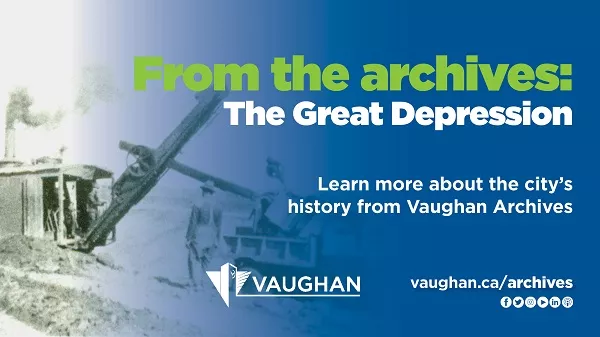From the archives: The Great Depression
Learn more about the
city’s history from the Vaughan Archives
From a farmland community to a bustling city centre and everything
in between – Vaughan’s transformation is a story worth telling. As part of a
monthly series, the City of Vaughan will be releasing historical content from
the Vaughan Archives, Office of the City Clerk. Citizens are encouraged to
scroll through memory lane, learn about the city’s past and explore the places,
people and events that were pivotal to the development of the city of Vaughan
that we know today.
The Great Depression was one of the most
significant events of the 20th century, both in Vaughan and across the
world. People lost savings, jobs and property following the economic turbulence
of 1929 and the early 1930s. This situation forced many labourers, who already
barely made ends meet due to poor wages, into an exceedingly precarious state.
As an agriculture-based
economy, with many of the community’s necessities produced on farms, Vaughan
was not as hard hit as major urban centres. However, the area still felt the
impact of the Great Depression as a number of residents travelled to Toronto
for work. In addition to employment provided by farms, several related service
industries were relatively unscathed, such as feed mills, sawmills, shipping
companies, farm-implement manufacturers and suppliers.
During the Depression, the
town participated in government relief programs such as the Unemployment
Relief Act of 1931, which provided $4 million for relief work and $500,000
for relief efforts. While relief work, such as the construction of Highway 7, a
large-scale make-work project, provided employment and wages for Vaughan
residents, direct relief allowed for the purchase of food, clothing and heating
supplies – things some residents urgently needed.
These programs ended in
May 1932, leading to an increased need for relief for the unemployed. To
alleviate this issue, members of the Council donated 10 per cent of their
salaries to the relief fund and encouraged other Township employees to do the
same. Council also launched the “Give a Man a Job” campaign in conjunction with
the Liberal newspaper, which aimed to employ local labourers.
ABOUT VAUGHAN ARCHIVES
Established in 1988,
the City of Vaughan
Archives
is home to more than 600 collections, consisting of both City records and cultural
records about Vaughan from 1860 to present day. Records include, but are not
limited to, the following:
- City business records with long-term legal and administrative value, such as Council meeting minutes, by-laws, assessment rolls, financial records, reports and official correspondence
- church, community and school records
- census records
- historical photographs
- land records
- historical maps, plans and aerial photographs
- newspapers
- personal papers of past residents and founding families, such as diaries, family histories, journals and letters
- records of local organizations both past and present
VIEW VAUGHAN’S ARCHIVES
ONLINE!
As part of the City's
COVID-19 response, Vaughan City Hall remains closed to the public – but the
City’s Archival Collection is on digital display for all to explore! The below
galleries are now available in the City’s online gallery on Flickr:
- Featured Artists of Vaughan
- Historical Families of Vaughan
- Historical Figures: Lord Beaverbrook
- Historical Photography
- Recollections of Rural Vaughan
- The Mary Wood Collection
- The Way We Were: Representations of Vaughan’s Past
- Vaughan Working Environments
- Vaughan Through the Ages: Medicine
- Vaughan Through the Ages: Music
- Vaughan Through the Ages: Sports and Recreation
A
personal Flickr account is not required to access the City’s online gallery,
which contains only a small selection of the full archives collection. If you
are looking for a certain image, original file, primary source record or more, contact
the Vaughan Archives by calling 905-832-2281 or emailing archives@vaughan.ca.
By managing and
preserving both City and community records, the Archives and Records Management
Services team ensures that Vaughan’s rich and varied history will continue to
be available for future generations. Learn more at vaughan.ca/archives.
-30-

